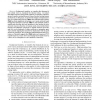Free Online Productivity Tools
i2Speak
i2Symbol
i2OCR
iTex2Img
iWeb2Print
iWeb2Shot
i2Type
iPdf2Split
iPdf2Merge
i2Bopomofo
i2Arabic
i2Style
i2Image
i2PDF
iLatex2Rtf
Sci2ools
107
click to vote
INFOCOM
2007
IEEE
2007
IEEE
A Multipath Background Network Architecture
— Background transfers, or transfers that humans do not actively wait on, dominate the Internet today. In today’s best-effort Internet, background transfers can interfere with foreground transfers causing long wait times, thereby hurting human productivity. In this paper, we present the design and implementation of a background network, Harp, that addresses this problem. Harp has three significant advantages over recent end-host based background transport protocols; Harp (i) uses multiple paths to exploit path diversity and load imbalance in the Internet to tailor network resource allocation to human needs, (ii) provides better fairness and utilization compared to unipath end-host protocols, and (iii) can be deployed at either end-hosts or enterprise gateways, thereby aligning the incentive for deployment with the goals of network customers. Our evaluation using simulations and a prototype on Planetlab suggests that Harp improves foreground TCP transfer time by a factor of five a...
Related Content
| Added | 03 Jun 2010 |
| Updated | 03 Jun 2010 |
| Type | Conference |
| Year | 2007 |
| Where | INFOCOM |
| Authors | Ravi Kokku, Aniruddha Bohra, Samrat Ganguly, Arun Venkataramani |
Comments (0)

